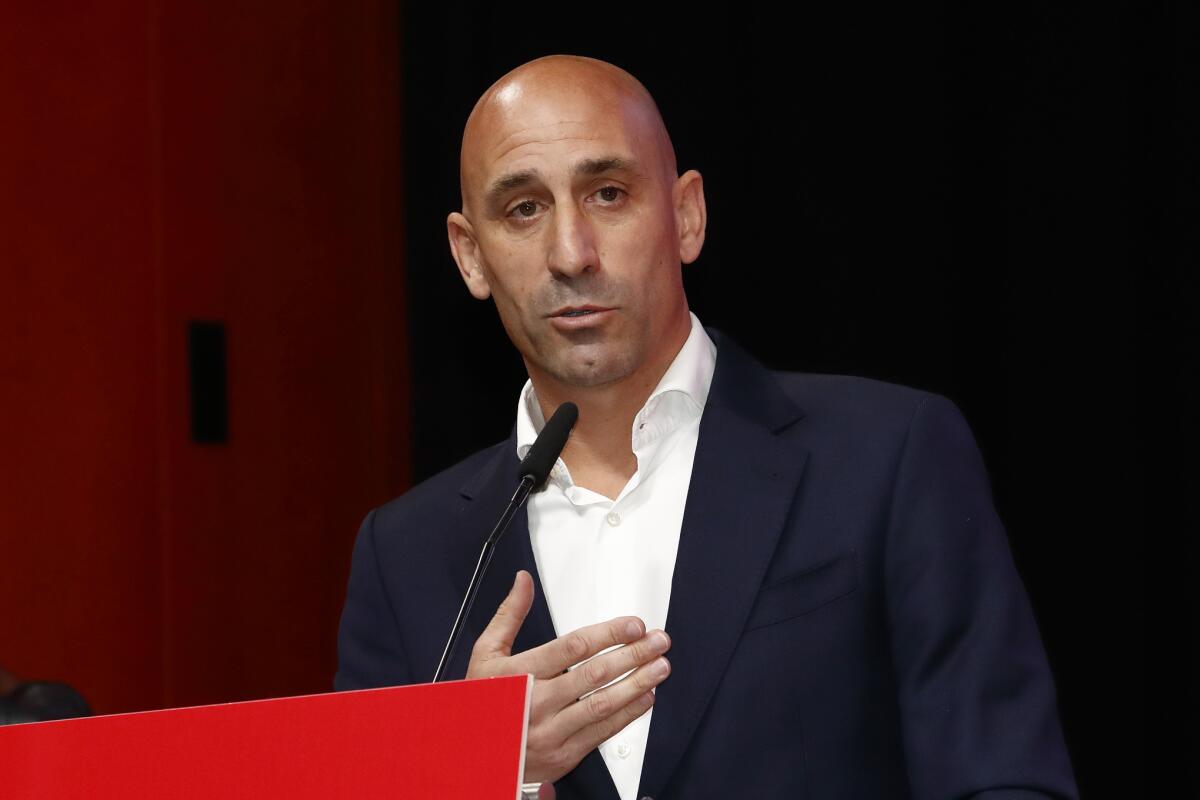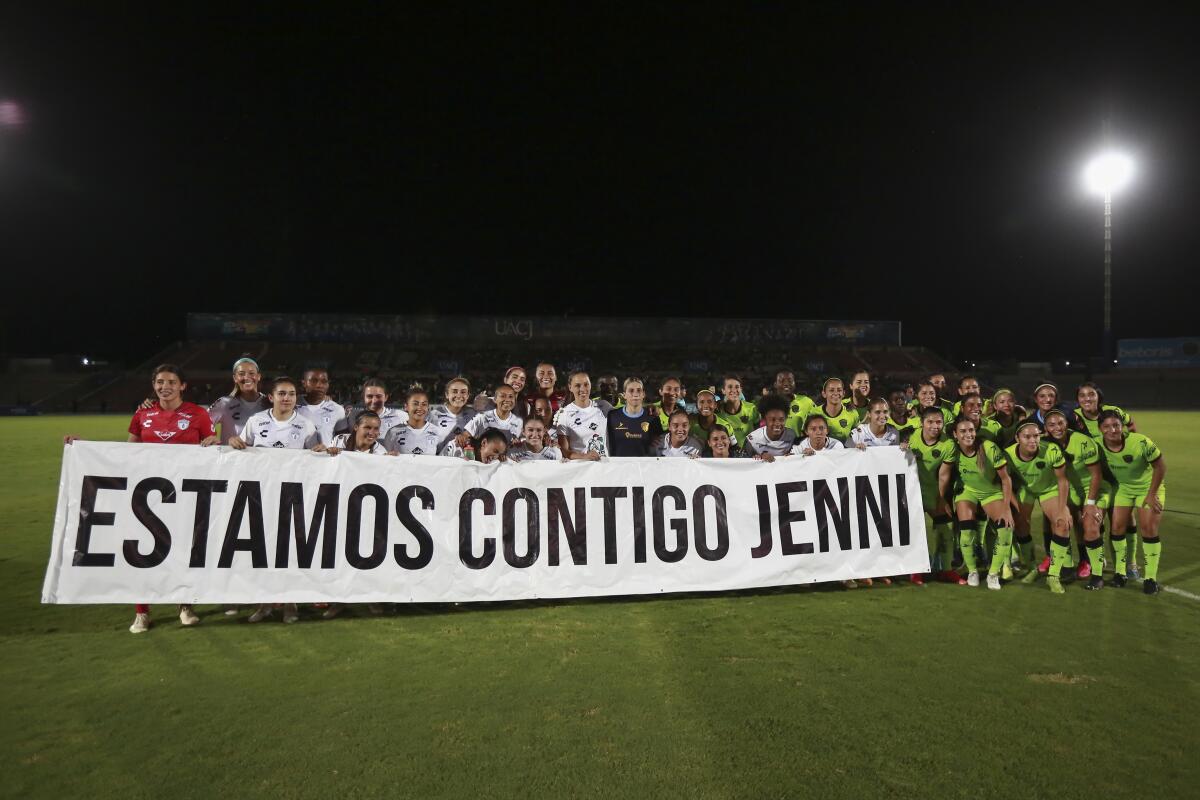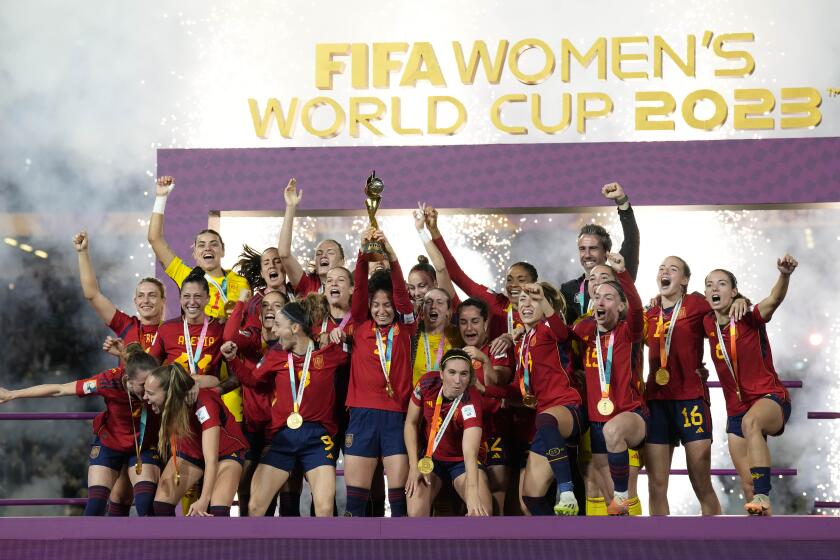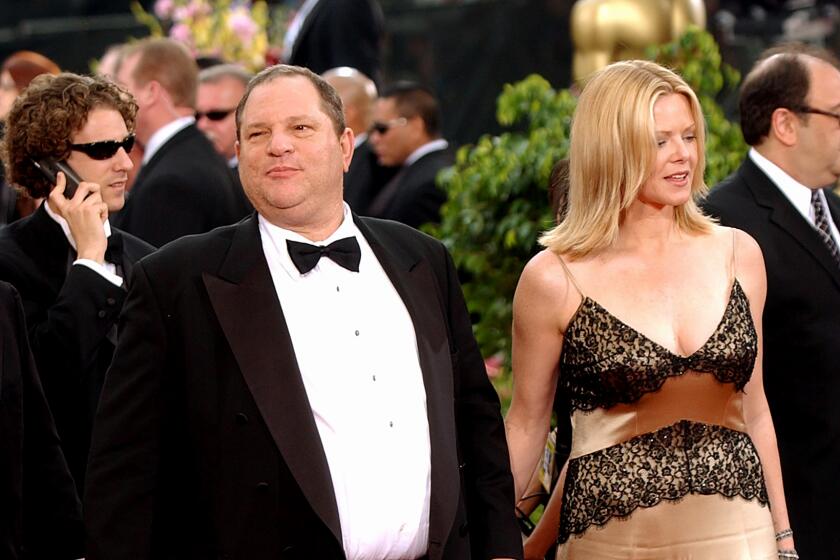Spain’s soccer chief kissed a World Cup winner. What he’s done since might be worse

- Share via
Many people believe that, to paraphrase computer science pioneer Rear Adm. Grace Hopper, it is better to ask forgiveness than permission. She was addressing the need to push back against rules that can impede progress, but over the years it has become a general mantra of maverick culture.
Even so, there is the expectation that you will do at least one of those two things. A key point Luis Rubiales, the president of Spain’s football federation, seems to have missed.
After his country’s women’s soccer team won its first World Cup ever, Rubiales took the opportunity provided by the celebratory air of the medal ceremony to publicly plant a kiss on the lips of star midfielder Jenni Hermoso.
It was an outrageous image that has upended Spanish soccer and dominated international conversation. Rubiales has claimed it was consensual — that when Hermoso grabbed him in an enthusiastic hug he asked if he could have “a little kiss” and she agreed. (It was not, by anyone’s definition a “little” kiss; photographs show Rubiales’ hands on either side of her head as he pressed his mouth against hers.)
Hermoso’s immediate reaction was shock and the admission that she “didn’t like it.”
Rubiales initially dismissed those upset as “idiots.” Then, perhaps realizing the anger would not vanish in a single news cycle, he addressed his actions. “I made a mistake, for sure,” Rubiales said in a video released to the media last week. “I have to accept it. In a moment of such emotion, without any bad intention or bad faith, what happened happened, in a very spontaneous way. [There was] no bad faith from either side.”
As is so often the case, his tepid “I’m sorry you feel this way” acknowledgment of a “mistake” only made the situation worse. To some, Rubiales’ behavior was perfectly in keeping with what they considered his long-standing problematic relationship with the women’s team. And while she had initially downplayed the kiss as “mutual,” Hermoso subsequently claimed she was pressured by Spain’s soccer federation to do so and that, in fact, she had neither been asked for nor granted consent for the kiss.
“I felt vulnerable and the victim of an impulse-driven, sexist, out-of-place act without any consent on my part,” Hermoso said in a statement Friday.
The president of Spain’s football federation kissed a player without her consent, among other acts of machismo. By refusing to resign, Rubiales adds to his abuse by stealing the ability of fans and players to celebrate a momentous victory.
Now, that is the moment in which a reasonable person would double down on his apology, acknowledge that conversations with team members have led him to examine his behavior in a different light and vow to do better.
A reasonable person might even offer his resignation to ensure that the glorious moment of the women’s victory was not tainted by his own poor judgment.
Then again, a reasonable person would know it is not appropriate for a boss to grab an employee by the head and kiss her on the lips, no matter what the situation. So it is perhaps not surprising that Rubiales, buoyed at least initially by some of his male colleagues and several male commentators, has instead continued to deny he did anything wrong.

Dismissing the idea that Hermoso is in the best position to know what she consented to and experienced, and disparaging those who called for his dismissal, Rubiales has insisted he will not resign and painted himself as the victim of overreacting “false feminists.”
It was an argument only a mother could believe and indeed, Rubiales’ mother reportedly has locked herself in a church and gone on a hunger strike until everyone stops being so mean to her boy.
Tempting as it is, let us ignore any Freudian implications of this particular plot twist and keep our eye on the ball. One that will not be touched by any member of Spain’s women’s soccer team, which has vowed not to play until Rubiales is fired and Spain’s soccer federation (RFEF) cleans house.
Because while FIFA gave him a 90-day suspension pending investigation on Saturday and Spanish prosecutors are looking into the matter as a potential act of sexual aggression, thus far RFEF is standing by its man.
On Friday, RFEF released a statement that accused Hermoso and others of lying about the kiss, threatening legal action and reminding the women’s soccer team that they are contractually obligated to play if called upon to do so.
In response, 11 members of the women’s soccer coaching staff resigned, leaving only head coach Jorge Vilda — who, after initially supporting Rubiales, has distanced himself, saying in a statement: “I regret that the victory of women’s soccer has been tarnished by the inappropriate behavior shown and acknowledged by our most senior manager up to that point, Luis Rubiales.”
As Jennifer Doyle pointed out in a recent Op-Ed for The Times, the kiss was just one of several things Rubiales, long accused of undervaluing women’s soccer, had been criticized for during the World Cup. He also grabbed his crotch in a macho gesture moments before the women’s victory, and, after the historic win, threw player Athenea del Castillo over his shoulder.
While physical acts of congratulations and exhilaration are common after big, never mind historic, wins, Rubiales’ lack of boundaries is just the latest example of the double standard female athletes continue to face. It is difficult not to think of the welter of criticism U.S. soccer star Brandi Chastain faced after she ripped off her own jersey in the male tradition of victory when Team USA won the 1999 World Cup.
If women’s sports are ever to be taken as seriously as men’s, female athletes must be allowed to show as much personality as their male counterparts.
Or, more recently, the condemnation LSU basketball star Angel Reese faced when she made the fairly common gesture of pointing to her ring finger as her team closed in on the NCAA championship.
More significant, however, is Rubiales’ belief that no real apology, or genuine examination of what lay behind the incident and the reaction it provoked, is necessary. That because he felt he had done no wrong, no wrong had been done; further apology would simply be capitulating to people who... what? Don’t understand the nature of sport? Were trying to condemn a natural male impulse? Were making a big deal out of a single kiss?
Much about the 2003 ceremony has aged poorly — or worse. Two decades on, we break down a night that portended a Hollywood reckoning to come.
Most humans have been on the receiving end of an uninvited kiss, whether it’s a relatively benign smooch from a bad-breathed relative, a drunken attempt to “see what happens” from a friend or a full-on predatory act of abuse.
For years, women have been warned of, and often forced to endure, mouth-to-mouth sexual harassment, often in an atmosphere that categorized such acts as just part of life or even the subject of humor. “We call him ‘The Tongue,’” Jessica Lange’s character says in “Tootsie,” warning Dustin Hoffman’s Dorothy Michaels of an older member of their soap opera’s cast. And when “the Tongue” finally catches Dorothy, the moment is played for laughs.
For most of Hollywood history, male heartthrobs were virtually expected to press kisses on unwelcoming female leads, whose subsequent slaps or angry words were considered part of the courtship ritual rather than real objections to unwanted advances.
Even when, at the 75th Oscars, lead actor winner Adrien Brody forced a long, dramatic kiss on presenter Halle Berry, the immediate consensus was more of admiration than horror. Who wouldn’t kiss Halle Berry if given the opportunity?
It wasn’t until #MeToo that we began acknowledging uninvited kisses as potential harassment. Especially when they occur in the workplace and/or in an unequal power dynamic.
Rubiales was not some overly enthusiastic fan, friend or colleague of Hermoso’s (none of whom, it must be said, should be excused for an uninvited kiss). He is her boss. With, as has been proved thus far by the Spanish soccer federation’s statements, a large and powerful organization behind him.
Hermoso, on the other hand, now has a large portion of women’s soccer fans, not to mention the world’s women, backing her up.
They saw what they saw and they’ve seen it far too often. And while it may often be better to seek forgiveness than permission, when you don’t do either, it’s time to resign.
More to Read
The biggest entertainment stories
Get our big stories about Hollywood, film, television, music, arts, culture and more right in your inbox as soon as they publish.
You may occasionally receive promotional content from the Los Angeles Times.














